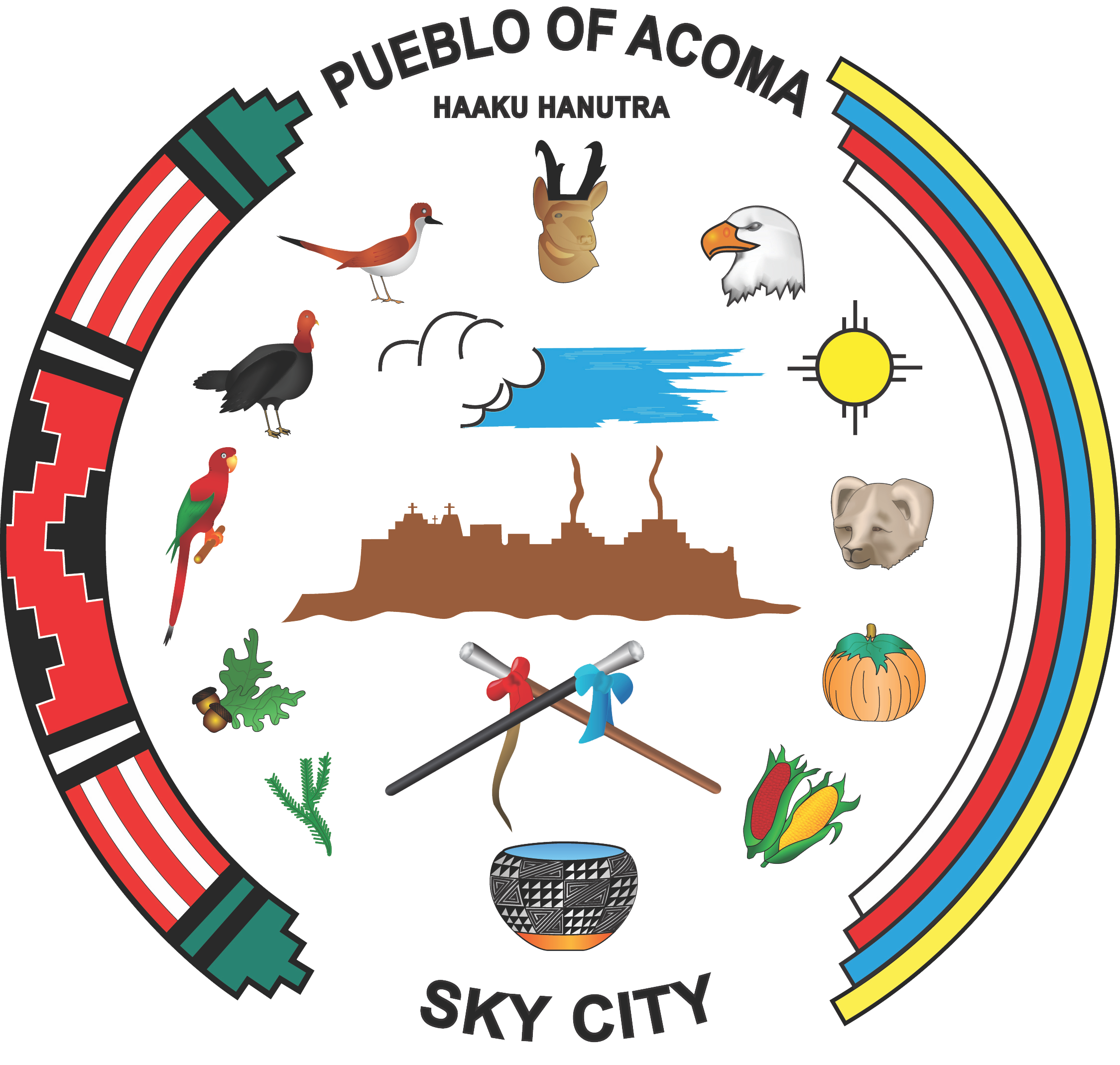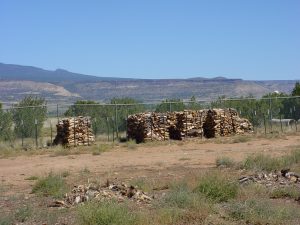Acoma Department of Natural Resources (ADNR)

Contact Information
Phone
505-552-5117
Fax
505-552-6139
Mailing Address
PO Box 489, Acoma, NM 87034
Physical Address
33A Pinsbaari Drive, Acoma, NM 87034
Office Hours
Monday – Friday
8:00 AM – 4:30 PM
Administrative Department
Franklin Martinez, Director
Valerie Patricio-Thompson, Administrative Assistant
Vacant, Natural Resources Assistant
Environment
Donna Martinez, Coordinator
Kandyce Suina, Ecosystems Technician
Agriculture
Faron Tortalita, Farm Specialist
Forestry Management
Shirley Piqosa, Tribal Forester
Kandyce Suina, Ecosystems Technician
NALEMP
Emilio Torivio, Manager
Range Management
Anthony Nunez, Range Specialist
Tribal Historic Preservation
Vacant, Director
Steven Concho, Officer
Kathy Felipe, Administrative Assistant
Water Rights
Kathleen Clemons, Coordinator
Acoma Department of Natural Resources (ADNR)
MISSION:
The Acoma Department of Natural Resources assists the tribal government and its programmatic offices in land use planning, determining land ownership, providing land management and maintaining a land records program.
SERVICES:
-
Assists the tribal government and programs in land use planning.
-
Provides the tribal government historical knowledge about present land and natural resources status and works with the tribal government on new land purchases.
-
Assists the tribal government in the management of land and natural resources.
Environmental Protection
The U.S. Environmental Protection Agency was one of the first federal agencies with a formal policy specifying how it would interact with tribal governments and consider tribal interests in carrying out its programs to protect human health and the environment. The EPA Policy for the Administration of Environmental Programs on Indian Reservations, signed in 1984, remains the cornerstone for EPA’s Indian program.
EPA is responsible for implementing federal environmental statutes in Indian country. In the absence of a federally approved tribal program, EPA retains program implementation authority. Currently, EPA maintains responsibility for the implementation of the vast majority of federal environmental statutes in Indian country covering:
- Air Quality
- Water Quality
- Environmental Quality
- Toxic Substances Control
- Hazardous Materials Control
- Clean up of uncontrolled or abandoned hazardous-waste sites
- Pesticide Control
Agriculture
In/Out farm field services are as follows:
In-Farm Field Services
- Plowing-tractor
- Disking-tractor
- Cultivation
- Seed Bed Preparation
- Borders
- Grubbing Small Brush
- Land Leveling
- Verification of Farmland Boundaries and Acreage
Request for Farm Work/Field forms.
Forestry Management
Wood Permits
Information needed:
- Name, Physical Address
- Acoma Census Number
- Vehicle(s)-Make/Model/Year/Color
- Purpose of Wood Harvest
- Additional Information to be considered.
Wood Sale
*Call or email our office to check for pricing and availability. Wood Sales are for Acoma residents ONLY.
Wood for Elderly or Disabled
*Call or email our office for availability.
Rules/Restrictions
- Big Game Hunting is prohibited.
- Harvesting/hauling from posted restricted areas is prohibited.
- Stay on permanent, established roads. Making of new roads is prohibited.
- Harvesting of Ponderosa Pine species is prohibited.
- Sale/transport of harvested wood outside Acoma lands is prohibited.
Native American Lands Environmental Mitigation Program (NALEMP)
DoD created NALEMP to address environmental impacts on Indian lands from former DoD activities with maximum tribal participation, through government-to-government consultation. Impacts NALEMP helps address include:
- Hazardous Materials
- Munitions Debris
- Unsafe Buildings or Structures
- Lead-based Paint or Asbestos
- Abandoned Equipment
Past DoD operational and training activities may have had adverse effects on tribal environmental health and safety, economic, social, and cultural welfare. In recognition of the need to address tribal concerns in DoD environmental programs, Congress has, since 1993, provided funds annually to mitigate environmental impacts to Indian lands and Alaska Native Claims Settlement Act (ANCSA)-conveyed properties.
NALEMP is the DoD environmental program that uses site evaluation and assessment processes, consistent with national environmental regulatory requirements, while also considering other potential effects on tribal communities’ way of life.
Range Management
Range Management is administered through the Livestock and Grazing Code of the Pueblo of Acoma Laws which governs:
- The branding, theft, disease, at-large estray, inspection, transportation and other domestic livestock within the exterior boundaries of the Pueblo of Acoma.
- Preservation of tribal natural resources, proper use of Acoma rangelands, equal utilization rights of all lands Acoma rangelands.
- Preservation of the public health, welfare and land of the Acoma people and their livestock.
- Prescribed punishments for violaations of any section of the laws.
- Fulfillment of 25 CFR §166.
Tribal Historic Preservation
 Mission
Mission
In October of 1999 the Pueblo of Acoma Tribal Council and Tribal Administration established the Office of Historic Preservation. By doing so, the Pueblo sought to address the increasing loss of history, culture and language of the Acoma people.
In its initial efforts the Acoma Historic Preservation Office (AHPO) sought to foster a greater awareness within the Acoma community to preserve its rich history by documenting and researching the complex influences that helped to shape Acoma. This effort resulted in a collection of photographs and documents archived for future use of the Acoma people.
In addition to these efforts, AHPO has been charged with the responsibility of protection of the Pueblo’s archaeological resources on and off tribal lands. We also provide tribal comment and guidance on projects under Section 106 of the National Historic Preservation Act (NHPA), consultation and repatriation guidance under the Native American Graves Protection and Repatriation Act (NAGPRA), as well as other federal, state and local laws pertaining to preservation and protection.
Preserving the Invaluable
In 1999 the Pueblo of Acoma requested that a Conditions Assessment be conducted on the historic mission of San Esteban del Rey built in 1629. The report showed extensive deterioration and the immediate need to re-stabilize the mission and convento walls. The Pueblo requested the input of the Pueblo’s traditional religious leadership and church caretakers known as sacristans and gaugushti, to assist AHPO in repairing and restoring San Esteban del Rey.
With support from then First Lady Hilary Rodham Clinton, the mission was designated as an American Treasure through the Save America’s Treasures Program in which generous financial support followed. More recently the Pueblo has received financial support from The National Trust for Historic Preservation, the Andy Warhol Foundation, the Getty Foundation and many others for overall restoration efforts. In addition to these efforts, AHPO is currently seeking support for conservation of the mission’s artwork, the reintroduction of a convento garden, and critical stabilization work for the Pueblo’s original 3-story homes many of which were first seen by the Spanish upon their arrival to this land.
Preservation through Education
Through its many project and collaborations with other programs, AHPO seeks to inspire others to the preservation and protection of our Acoma culture. AHPO provides opportunities for its own people to learn traditional building methods and apply those skills in on-going projects.
The Acoma Historic Preservation Office supports the efforts and education classes initiated through the Acoma Language Retention Program and the Haak’u Museum and Visitor’s Center. Through our collective efforts we will ensure that the culture, traditions, and language of our people will continue for future generations to come.
Water Rights/Litigation
The Acoma people recognize that they are part of a larger community that includes the heavens, the oceans, the elements, and all species of plant and animal life. Our sense of unity with all assures our continued survival and gives rise to a duty to preserve and protect the air, water, and land for future generations.
The Pueblo of Acoma Tribal Council created the Acoma Water Office for carrying out tribal written laws concerning water management, use, preservation, and restoration.
Because of the significance of water to the Pueblo of Acoma, the Pueblo of Acoma Tribal Council also created the Acoma Water Commission which is responsible for:
- Reviewing and developing information concerning water resources.
- Developing goals, based on the best information available, for presentation.
- Informing the Tribal Council and Acoma Community of progress in securing water.
- Representation of the Pueblo in litigation/negotiations concerning the adjudication of Pueblo water rights.